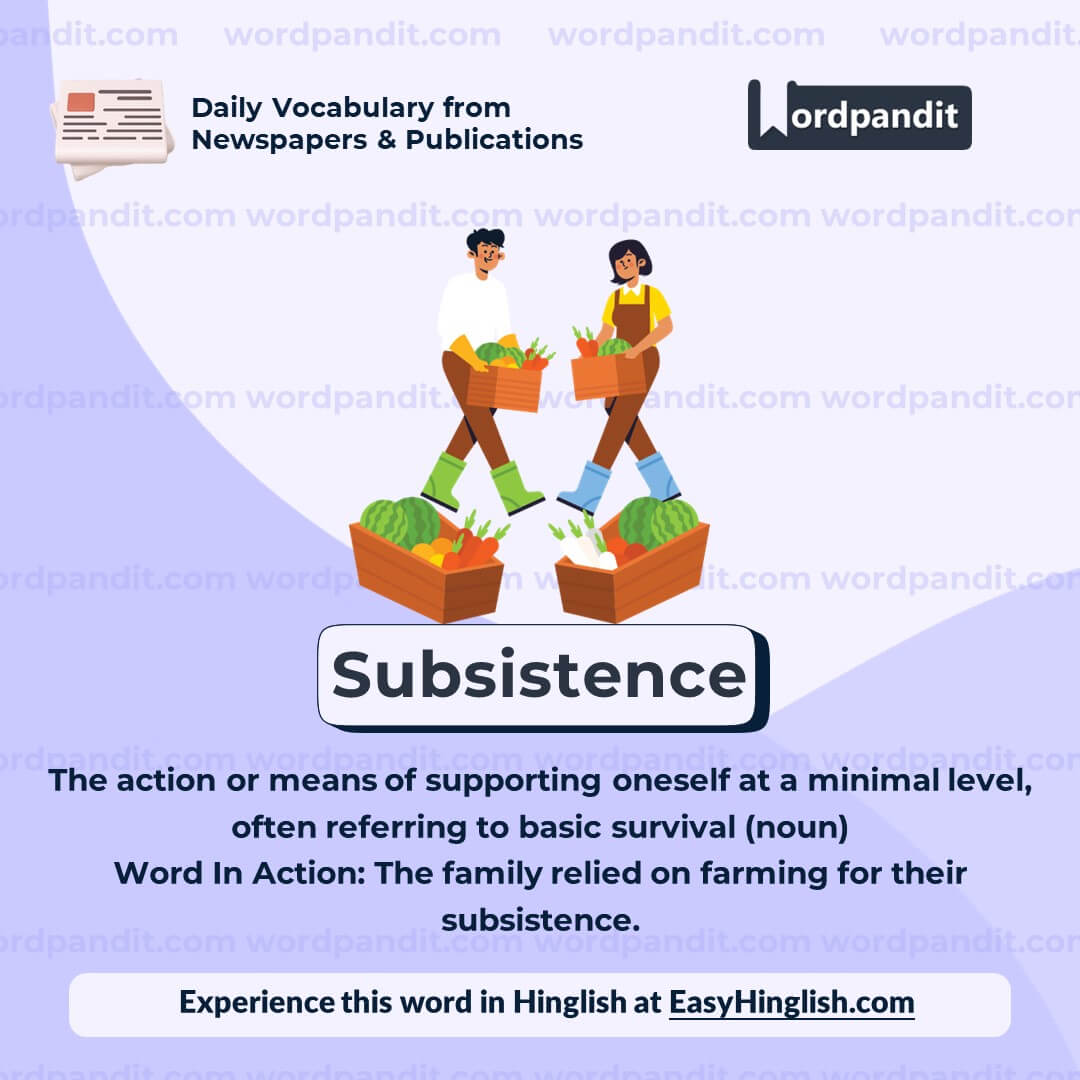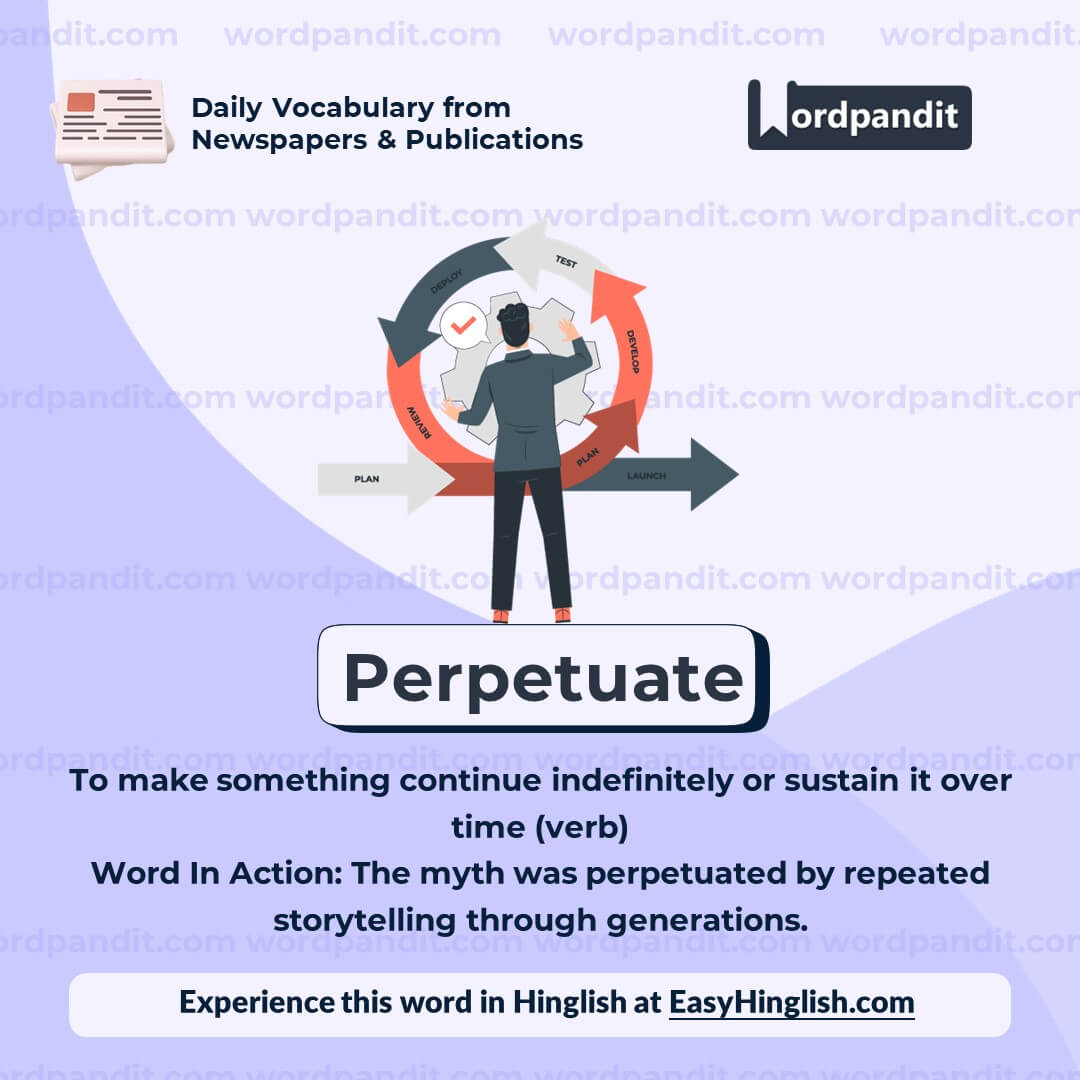Daily Vocabulary from International Newspapers and Publications
Expand Your Vocabulary with Wordpandit’s Global Vocabulary Hub
At Wordpandit, we are committed to helping you develop a truly global vocabulary by drawing from some of the most respected international publications. This section is designed to keep you ahead of the curve by introducing you to words that define global conversations and trends.
The Power of Global Sources
To help you think and communicate on a global scale, we curate vocabulary from renowned international sources, such as:
- The New York Times
- The Washington Post
- BBC
- The Guardian
- The Economist
- Scientific American
- Psychology Today
- And many more...
Stay Global, Stay Competitive
Our daily updates from international publications ensure you are consistently exposed to new words that reflect global news and developments, making sure your vocabulary is not only current but also globally relevant.
Enhance Your Global Perspective
Whether you’re preparing for international exams, aiming to excel in global business communication, or want to enhance your language skills for personal growth, Wordpandit offers the resources you need to thrive in a global context.
Effective Learning, Global Reach
Our learning methodology combines global examples, memory aids, and interactive activities, allowing you to internalize new words effectively and apply them in real-world scenarios.
Begin Your Global Vocabulary Journey Now!
Why Choose Wordpandit?
Practical Learning: Focus on words you'll actually encounter in real-world reading, enhancing your comprehension and communication skills.
Diverse Content: From current affairs to scientific breakthroughs, our varied sources expose you to vocabulary across multiple domains.
Effortless Integration: Make Wordpandit a part of your daily routine. Just a few minutes each day can significantly boost your lexicon over time.
Your Path to Vocabulary Mastery
- Visit our Daily Vocabulary section regularly
- Explore new words and their usage in context
- Practice incorporating these words into your own writing and speech
- Track your progress as your vocabulary expands
Start Your Journey Today
Embark on your vocabulary enhancement journey with Wordpandit. By consistently engaging with our daily posts, you'll build a robust vocabulary that serves you well in academic, professional, and personal contexts.
Remember, a word a day keeps linguistic limitations at bay. Make Wordpandit your daily companion in the quest for vocabulary excellence!
WORD-1: Endow
Context:
"Excavating the sediments our predecessors left in our collective consciousness is not a task that we are naturally disposed to perform. It is an act of remembrance and self-understanding that can destabilise our identities because it counters the processes that endow them with authenticity." - Aeon
Explanatory Paragraph:
The word "endow" refers to the act of giving or bestowing something, often intangible, such as a quality, trait, or value, to a person, institution, or object. It signifies the transfer of an attribute that enriches or defines the recipient. For example, to endow someone with intelligence means to provide them with this quality.
Meaning: To provide, bestow, or equip someone or something with a particular quality or asset (verb).
Pronunciation: en-dow
Difficulty Level: ⭐⭐ Moderate
Etymology: The word "endow" originates from the Old French "endouer," meaning "to endow or provide," which in turn comes from the Latin "dotare," meaning "to give a dowry."
Synonyms & Antonyms:
Synonyms: Provide, bestow, equip, grant, furnish
Antonyms: Deprive, strip, withhold, remove, dispossess
Usage Examples:
- Her parents decided to endow the local library with a significant donation to support literacy programs.
- The artist was endowed with a remarkable ability to capture emotions in her paintings.
- Nature has endowed this region with stunning landscapes and abundant wildlife.
- The scholarship was created to endow deserving students with the resources needed to pursue higher education.
Cultural Reference:
"The Rockefeller Foundation was established to endow various initiatives in health, education, and scientific research, becoming a symbol of philanthropy in the modern world." - Historical Reference
Think About It:
What qualities or attributes do you think are most important to endow future generations with, and why?
Quick Activity:
List three things you believe your culture or family has endowed you with, and explain how they have shaped your personality.
Memory Tip:
Remember "endow" by associating it with the phrase "in doubt, provide" — it suggests the act of giving or providing something valuable to others.
Real-World Application:
The concept of endowment is often seen in education, where universities are endowed with financial support to fund scholarships, research, and facilities. Similarly, individuals are often described as being endowed with talents, emphasizing their natural abilities.
WORD-2: Subsistence
Context:
"Consider our (quasi-)universal agrarian mode of subsistence, and our single nutritional and psychotropic order, which is based on an incredibly small number of starchy crops (including wheat, maize, rice), domesticated animals (cows, chickens) and stimulants (coffee, sugar) uniformly consumed across the planet." - Aeon
Explanatory Paragraph:
The term "subsistence" refers to the means by which an individual, group, or society survives, often with a focus on meeting the most basic needs such as food, water, and shelter. It is commonly used to describe a minimal level of existence that allows survival, especially in the context of farming, economics, or livelihoods. For example, a subsistence farmer produces just enough to feed their family without surplus for trade or profit.
Meaning: The action or means of supporting oneself at a minimal level, often referring to basic survival (noun).
Pronunciation: sub-sis-tens
Difficulty Level: ⭐⭐ Moderate
Etymology: The word "subsistence" originates from the Latin "subsistentia," meaning "existence" or "standing under," which is derived from "subsistere," meaning "to stand firm or remain."
Synonyms & Antonyms:
Synonyms: Survival, livelihood, sustenance, maintenance
Antonyms: Luxury, abundance, surplus, affluence
Usage Examples:
- In many remote regions, communities rely on subsistence agriculture to survive.
- The harsh climate forced the settlers to adopt a subsistence lifestyle, growing only what they needed to eat.
- The report highlights the challenges of subsistence fishing as climate change impacts marine ecosystems.
- Subsistence wages are barely enough to cover basic living expenses for workers in the garment industry.
Cultural Reference:
"For centuries, indigenous peoples around the world have practiced subsistence living, relying on traditional knowledge and sustainable practices to meet their basic needs." - Cultural Anthropology Texts
Think About It:
How do modern lifestyles differ from subsistence-based living, and what can we learn from subsistence practices in terms of sustainability?
Quick Activity:
List three examples of subsistence activities (e.g., farming, fishing, hunting) and discuss how they might still play a role in certain communities today.
Memory Tip:
Remember "subsistence" by associating it with "sub-sist" — where "sub" suggests "under" or "basic" and "sist" means "to stand," thus indicating a minimal level needed to stand or survive.
Real-World Application:
Subsistence farming and fishing are still vital in many rural and developing regions, where communities depend on these activities for survival. Understanding subsistence practices is essential for creating policies that promote sustainable development while respecting traditional livelihoods.
WORD-3: Facilitated
Context:
"Local languages into global languages and lingua francas – French, Arabic, classical Chinese, Nahuatl, Maya, Greek or Akkadian – which facilitated and intensified cross-cultural relations." - Aeon
Explanatory Paragraph:
The word "facilitated" means to make a process or action easier or smoother. It is often used to describe the act of helping something progress or move forward with less difficulty. For example, a teacher facilitates learning by creating an environment where students can easily acquire knowledge.
Meaning: To make an action or process easier or smoother (verb).
Pronunciation: fuh-sil-i-tayt-ed
Difficulty Level: ⭐ Easy
Etymology: The word "facilitated" comes from the Latin "facilis," meaning "easy," and the verb "facilitare," meaning "to make easy."
Synonyms & Antonyms:
Synonyms: Enabled, simplified, assisted, promoted, aided
Antonyms: Hindered, obstructed, complicated, impeded
Usage Examples:
- The new highway has facilitated faster travel between the two cities.
- The introduction of email facilitated global communication in ways previously unimaginable.
- Her leadership skills facilitated a smoother transition during the organizational change.
- The translator facilitated the meeting by ensuring that both parties could understand each other.
Cultural Reference:
"The invention of the printing press facilitated the spread of knowledge during the Renaissance, revolutionizing education and access to information." - Historical Reference
Think About It:
How has technology facilitated globalization, and what are the potential advantages and disadvantages of this facilitation?
Quick Activity:
Think of a recent innovation (e.g., an app, a tool, or a service) that facilitated a daily task for you. Write a short description of how it made the task easier.
Memory Tip:
Remember "facilitated" by breaking it down: "facile" means "easy" in French, so facilitating is about making things easy or smoother.
Real-World Application:
The concept of facilitation is widely used in education, business, and technology. For example, teachers facilitate learning by guiding discussions, while project managers facilitate collaboration by organizing resources and ensuring effective communication among team members.
WORD-4: Constancy
Context:
"It displays such a degree of constancy that it must be fundamental to the evolution of human society. Far from being a mere lifestyle or worldview – or an invention of the elite – globalisation can be understood as the mass process through which human culture evolves and perpetuates itself." - Aeon
Explanatory Paragraph:
The word "constancy" refers to the quality of being consistent, unchanging, or dependable over time. It is often associated with stability, reliability, and unwavering commitment to a principle, value, or action. For example, the constancy of a friend means their loyalty and steadfastness through changing circumstances.
Meaning: The quality of being unchanging, stable, or reliable (noun).
Pronunciation: kon-stan-see
Difficulty Level: ⭐⭐⭐ Intermediate
Etymology: The word "constancy" comes from the Latin "constantia," meaning "firmness, steadfastness," which is derived from "constans," meaning "standing firm or unchanging."
Synonyms & Antonyms:
Synonyms: Stability, steadfastness, reliability, permanence, dependability
Antonyms: Variability, inconsistency, changeability, fickleness
Usage Examples:
- The constancy of the lighthouse's light served as a beacon of hope for sailors lost at sea.
- His constancy in upholding his values earned him the respect of his peers.
- The constancy of Earth's gravitational pull allows life to exist as we know it.
- Her unwavering constancy in supporting the team inspired everyone around her.
Cultural Reference:
"The constancy of the North Star has been a metaphor for guidance and reliability throughout history, used by explorers and poets alike." - Historical Reference
Think About It:
Why do you think constancy is important in building trust, both in personal relationships and in institutions?
Quick Activity:
Write down two areas in your life where constancy has helped you achieve stability or success. Reflect on why being consistent made a difference.
Memory Tip:
Remember "constancy" by linking it to "constant." If something is constant, it stays the same, so constancy refers to the quality of being constant and reliable.
Real-World Application:
Constancy is crucial in various fields. For example, in science, the constancy of natural laws forms the foundation for experimentation and discovery. In relationships, constancy builds trust, while in business, consistent performance ensures customer loyalty.
WORD-5: Perpetuate
Context:
"It displays such a degree of constancy that it must be fundamental to the evolution of human society. Far from being a mere lifestyle or worldview – or an invention of the elite – globalisation can be understood as the mass process through which human culture evolves and perpetuates itself." - Aeon
Explanatory Paragraph:
The word "perpetuate" means to cause something to continue indefinitely, often something abstract like a tradition, idea, or problem. It is used when something is kept alive or maintained over time, whether intentionally or unintentionally. For instance, perpetuating a stereotype means continuing to spread or reinforce it rather than allowing it to fade away.
Meaning: To make something continue indefinitely or sustain it over time (verb).
Pronunciation: per-pet-yoo-ate
Difficulty Level: ⭐⭐ Moderate
Etymology: The word "perpetuate" comes from the Latin "perpetuatus," meaning "to make perpetual," which is derived from "perpetuus," meaning "continuous or uninterrupted."
Synonyms & Antonyms:
Synonyms: Sustain, maintain, preserve, prolong, continue
Antonyms: End, abolish, discontinue, terminate, eradicate
Usage Examples:
- The museum was established to perpetuate the memory of those who fought in the war.
- Unquestioned traditions often serve to perpetuate social inequality.
- The media's portrayal of certain groups can perpetuate harmful stereotypes.
- The foundation's goal is to perpetuate the legacy of its founder through scholarships and community programs.
Cultural Reference:
"The Pyramids of Egypt are an example of how ancient civilizations perpetuated their cultural and religious beliefs through monumental architecture that has lasted for millennia." - Historical Context
Think About It:
What are some traditions or practices in your culture that have been perpetuated over generations? Are there any you believe should change or evolve?
Quick Activity:
Identify a positive idea or habit that you would like to perpetuate in your community or family. Write a sentence about why it is important to sustain it.
Memory Tip:
Think of "perpetuate" as "per-pet-you-ate" — where "per" means "through" or "continuously" and "pet" can remind you of something cherished or kept alive, like the idea of "keeping it going."
Real-World Application:
"Perpetuate" is commonly used in discussions about social and cultural issues. For example, education plays a role in perpetuating knowledge and values, while unchecked biases can perpetuate systemic inequalities. Understanding this term helps in identifying cycles and determining how to sustain or break them.


















